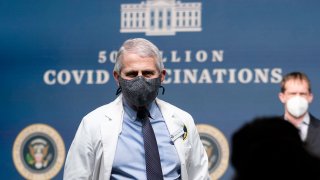
If you've already received the COVID-19 vaccine, it's important not to let your guard down - at least not yet, according to Dr. Anthony Fauci, director of the National Institute of Allergy and Infectious Diseases and one of the nation's top coronavirus experts.
After virtually accepting an award Thursday night from the University of Chicago Harris School of Public Policy, Fauci addressed what he previously called the "looming question" - whether vaccination can prevent transmission of the virus.
WATCH ANYTIME FOR FREE
Stream NBC10 Boston news for free, 24/7, wherever you are. |
"We don't know yet whether or not it prevents you from getting infected where you're not with symptoms...but you have virus in your nasopharynx that you could then infect an unvaccinated person who might be vulnerable, and you will inadvertently and innocently get them sick," Fauci explained.
During the discussion, the doctor cited a study from Israel, a country with high rates of infection that now leads the world in vaccinations per capita, that determined the COVID-19 vaccine can slow the spread of the virus.
Get updates on what's happening in Boston to your inbox. Sign up for our News Headlines newsletter.
The paper found that individuals who were infected after receiving their first dose of the Pfizer-BioNTech vaccination had a “markedly diminished” viral load compared with unvaccinated people, NBC News reported.
It’s another example of “scientific data starting to point to the fact that [the vaccine] … has very important implications from a public health standpoint for interfering and diminishing the dynamics of the outbreak,” Fauci previously said.
He added the United States is conducting research of its own to nail down the findings from Israel's study.
"It may be that we will show that if the level of virus in your nasopharynx because you're vaccinated is so low that you don't have to worry about transmitting, that's going to be a game changer for what a vaccinated person can or cannot do," Fauci said.
The doctor explained that if the findings are corroborated, Americans will likely see a pulling back on some restrictions, but emphasized "we're not there yet."
Until that happens, people are advised to continue following COVID-19 mitigation measures such as wearing face coverings, social distancing and handwashing.

